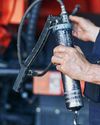Intentar ORO - Gratis
WHEN TO USE A SINGLE POINT LUBRICATOR
MACHINERY LUBRICATION INDIA
|January - February 2024
When it comes to the efficient and effective application of grease, a single point lubricator (SPL) can prove to be an extremely beneficial tool in our arsenal.
-

Single-point lubricators help engineers regularly and automatically deliver a small amount of grease or lubricating oil to a specific area, which:
• Extend the life of bearings
• Prevent extended downtime due to lubrication-related failures
• Eliminate the human-error element Because of their importance, it's critical that we understand when it's appropriate to apply this technology to capitalize on the available benefits for our teams and facilities. But of ten times this is easier said than done.
SPLs are not a one-size-fits-all type of technology: there are many different types and variations available on the market that can meet a variety of greasing needs, and not all of them function the same.
So, before we start selecting SPLs at random and begin plugging them into all our bearings, there are several questions we should ask ourselves first to determine if a specific single-point lubricator is justifiable for your specific application, or if you should stick with manual greasing practices.
Does the Bearing Require Frequent Lubrication?
Yes - Consider a single-point lubricator.
No - Consider manual greasing.
Is the Bearing Difficult to Access?
Yes - Consider a single-point lubricator.
No - Consider manual greasing.
Is the Bearing Critical to Equipment Operation?
Yes - Consider a single-point lubricator.
Esta historia es de la edición January - February 2024 de MACHINERY LUBRICATION INDIA.
Suscríbete a Magzter GOLD para acceder a miles de historias premium seleccionadas y a más de 9000 revistas y periódicos.
¿Ya eres suscriptor? Iniciar sesión
MÁS HISTORIAS DE MACHINERY LUBRICATION INDIA

MACHINERY LUBRICATION INDIA
PREDICT OIL USEFUL LIFE WITH REAL-TIME DATA
Oil is the life of any hydraulic or lubrication system.
8 mins
November – December, 2025

MACHINERY LUBRICATION INDIA
HOW THE RIGHT LUBRICATION TOOLS AND HARDWARE INFLUENCE MACHINE RELIABILITY
Having spent a good portion of my career around heavy machinery, both in the military and later in the civilian world, I’ve come to realize one critical fact: the tools you use matter just as much as the skills you have.
4 mins
November – December, 2025

MACHINERY LUBRICATION INDIA
Unlocking the Power of Oil Analysis & Particle Counting
Lubrication practices ensure peak performance and longev ity in machinery maintenance.
4 mins
November – December, 2025

MACHINERY LUBRICATION INDIA
BEYOND THE LABEL: UNDERSTANDING LUBRICANT TECHNICAL AND SAFETY DATA SHEETS
Over the years in lubrication, I have noticed that many professionals either overlook or misinterpret lubricant datasheets, especially Product Datasheets (PDS), which are key to selecting the proper lubricant. While Safety Datasheets (SDS) are widely known due to compliance requirements, the PDS holds the technical insights needed for informed decision-making. Yet, it is often misunderstood or ignored.
3 mins
November – December, 2025

MACHINERY LUBRICATION INDIA
SMART FILTRATION IN HEAVY INDUSTRIES:
PROTECTING WORKERS IN CEMENT AND STEEL MANUFACTURING
5 mins
November – December, 2025

MACHINERY LUBRICATION INDIA
IOCL & INFINEUM FORGE STRATEGIC LUBRICANT PARTNERSHIP
Infineum India and Indian Oil Corporation Limited (IOCL) have signed a strategic Memorandum of Understanding (MoU) aimed at deepening their collaboration to unlock long-term business value and drive innovation in India's mobility sector. The agreement was formalized at IOCL's Mumbai office, with Bakim Patra, Executive Director (Lubes) at IOCL, and Harshad Jambaulikar, General Manager of Infineum India, as the principal signatories.
1 min
November – December, 2025

MACHINERY LUBRICATION INDIA
CONTAMINATION REALIZATION: A CASE EXAMPLE AT A STEEL MILL
Condition monitoring, contamination control, lubrication excellence, and machine reliability are keywords that are often overused and misunderstood.
6 mins
November – December, 2025

MACHINERY LUBRICATION INDIA
BREAKING DOWN THE BASICS: A LESSON IN ASSET RELIABILITY
Before you go marching down to your reliability engineers and ask questions like, “What are the top 10 worst performing assets in our production line?”, it’s important to know the actual difference between an asset and reliability.
7 mins
November – December, 2025

MACHINERY LUBRICATION INDIA
EFFECTIVE USE OF THE PATCH TEST FOR SIMPLE ON-SITE ANALYSIS
The very best oil analysis programs incorporate some degree of onsite analysis. For most plants, mills, and mines, particle monitoring is the most productive onsite oil analysis activity available.
4 mins
November – December, 2025
MACHINERY LUBRICATION INDIA
CAFFEINE VS. CALM: FINDING THE RIGHT ENERGY BALANCE DURING WORK HOURS
For many of us, the workday doesn't officially begin until the first sip of coffee. In industrial and corporate settings alike, caffeine is often seen as a silent coworker, fueling early mornings, long shifts, and back-to-back meetings.
2 mins
November – December, 2025
Listen
Translate
Change font size

